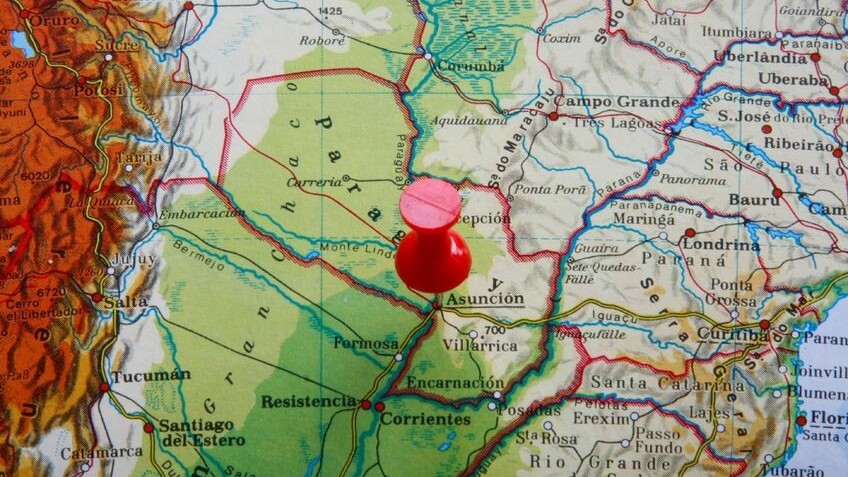
With less than two months left to The Next Web Conference Latin America, we help you get ready with a new post series that will bring you everything you need to know about this exciting region.
This was the first question we tried to answer when we kickstarted our Latin America channel 14 months ago: Where is Latin America’s Silicon Valley? The answer, as you may remember, is that there isn’t one – but rather a multiplicity of tech hubs all across the south of the continent.
It is important to note that a lot has happened over this period, which is not very surprising in a fast-growing region such as Latin America. Foreign VC funds have moved South, accelerators have mushroomed and new opportunities have blossomed – not just in capital cities, but also in regional hubs.
Although some may disagree, we tend to think of this fragmentation as a strength. As a matter of fact, it also means that wannabe entrepreneurs can attend meet-ups in their own city, connect with a like-minded crowds and local mentors, find a co-founder and do great things without having to move to the Valley – at least up to a certain point.
Still, it makes communication a challenge, which is why it’s crucial to have events that give these different ecosystems a chance to connect – and we hope that TNW Conference Latin America will be one of these.
Without further ado, here’s a selection of Latin American tech hubs you should check out, from North to South:
Miami, USA

There’s no arguing about it: Miami belongs to Latin America as much as it belongs to the US. In this context, it is hardly surprising to see startups open offices in Miami to target the Latin American market. To give only a couple of examples, this is the case of two companies we have reviewed over the last few months: the language learning platform OpenEnglish and the music service Senzari.
Interestingly, the connection also works the other way around. As the Miami-based angel investor Marco Giberti pointed out in the interview we published recently, targeting the US Hispanic market can be a good strategy for Latin American startups to crack the US market, and Miami a good starting point for US expansion.
In other words, Miami is a powerful bridge between the US and Latin America – and New York City will have to keep up its efforts if it wants to challenge this position.
Monterrey, Mexico

(Image credit: NightRStar)
Despite the wave of violence that has badly hit the city over the last couple of years, Monterrey fully deserves its place on this list. As we reported when we wrote about the city’s first Startup Weekend last September, the tech scene’s movers and shakers are determined to fight against negative forces.
As a matter of fact, Monterrey has valuable assets when it comes to building a strong tech ecosystem, starting with talent. Quoting our story: “It’s headquarters to the respected ITESM university, also known as Monterrey Tech. ITESM is only one of Monterrey’s educational institutions, which also include CEDIM, the design and innovation university which welcomed Startup Weekend Monterrey.”
This tech ecosystem can obviously be leveraged to create startups; unsurprisingly, it has already given birth to young companies such as the website builder Sidengo and the food ordering platform Atumesa. In addition, it also boasts a high-profile VC fund, Alta Ventures.
Mexico City, Mexico

While Monterrey is an interesting hub, there’s no doubt that Mexico City is a much larger one, thanks to its huge metropolitan population of over 21 million. This is obviously a very attractive market for local B2C startups such as entertainment check-in app Yumbling and food delivery service Sindelantal.mx (formerly known as Miorden before its acquisition by its Spanish counterpart).
Over the last couple of years, the city has also consolidated its ecosystem, with the opening of co-working spaces such as El 3er Espacio and the launch networking events such as Lean Startup DF, promoted by the new early stage fund Investomex. The city also plays host dev meetups such as the local version of SuperHappyDevHouse, brought to Mexico by the same key people behind Silicon Valley’s first seed fund and accelerator for Mexico, Mexican.VC.
As a matter of fact, the country and its capital are increasingly attracting attention in the US – and our West Coast Editor Drew Olanoff was one of several foreigners to speak at Apptualizate’s conference last March. This new event is an interesting addition to Mexico’s line-up of events, which also includes the big startup-focused event SG Emprende. More recently, we learned that Startup Weekend was about to open offices in Mexico to take its local operations to the next level.
San Juan, Puerto Rico

We first wrote about Puerto Rico last January, when it became difficult to ignore the big push that key local players were trying to give to the local startup scene of this US commonwealth. At the time, this small group of like-minded people had just launched StartupsofPuertoRico (SoPR), on the heels of a series of successful events such as TEDxSanJuan and Puerto Rico’s first Startup Weekend – not to mention several Barcamps.
Puerto Rican entrepreneur and mentor Ramphis Castro tells us that the last few months have been very positive for the island’s tech ecosystem. While existing initiatives have grown, including SoPR itself, new projects have also emerged, and Founder Institute’s local chapter is currently accelerating its first class of startups – a considerable achievement.
Still, a lot remains to be done, and the local blog Mindchemy recently listed 5 elements Puerto Rico needs for its startup to blossom: more angels, a co-working space, a forum where founders can exchange ideas, a conference series by successful founders, and EIRs who could spend a few months on the island and share their knowledge.
Caracas, Venezuela

Considering Venezuela’s problems, it is not surprising to find talented Venezuelan entrepreneurs creating startups in the US. For instance, this is the case of Techstars’ alumnus Piictu.
More recently, BetaBeat dedicated a profile piece to Quotidian Ventures’ founder, New-York based Venezuelan angel Pedro Torres Picón and his investments in New York. Yet, this isn’t only about the US, and Quotidian Ventures itself invests in Latin American startups, such as crowdfunding platform Idea.me.
Back in Venezuela, a tech scene is also emerging in Caracas. Last March, Telefónica’s accelerator Wayra opened its local academy to host the 10 Venezuelan teams it had selected among more than 650 pitches. In addition, the city also boasts co-working spaces, ‘Espacios Accede,’ which also play host to training and networking events.
Guatemala City, Guatemala

When we took a closer look at the tech ecosystem across Central America last October, we came to the conclusion that most of the local talent was working for design and development shops geared towards foreign companies, especially US ones. In this context, the number of local world-class startups is still very limited.
However, Guatemala has bigger ambitions and hopes to change this state of fact, the New York Times recently reported in an article titled “A Silicon Valley Dream Grows in Guatemala, Despite the Risks.” This is particularly true in Guatemala City, thanks to Campus Tecnológico, also known as TEC Guatemala.
TEC occupies the entirety of a multi-storey building, which plays host to young seeds such as Milk n’Cookies, one of the early stage companies that TEC is currently incubating. While it is still early days, this is a very promising initiative, which could change the face of Guatemala as we know it.
Medellin, Colombia

(Image credit: jduquetr)
Puerto Rico is one of the only cities to recently welcome a new chapter of Founder Institute, as did Medellin. Launched last April, the program is led by US-born entrepreneur Alan Colmenares, whom we once listed as one of the 9 foreigners you should know in Latin America.
This is one of the many changes that took place in Medellin over the last decade. Once infamous, Colombia’s second largest city is going through a full-blown revitalization. On one hand, it is tackling its urban problems, for instance with innovative escalators which help connect the slums with other neighborhoods. On the other hand, it is also working on consolidating itself as a tech hub.
As we reported, its Secretary of Education is promoting an ambitious initiative known as Medellín Digital, and rumor has it that the city could play host to the next edition of Campus Party in Colombia, as the event may leave Bogotá next year.
Bogotá, Colombia

Bogotá is yet another Latin American city where Founder Institute is now running its acceleration program. The city also has its own Wayra academy, which will soon welcome its second class, as well as a well-known co-working space, HubBOG (see our post about ‘Eleven Latin American Co-Working Spaces You Should Try Out‘).
More generally, the city is consolidating itself as a tech hub for startups interested in affordable, quality development work and/or in tapping the growing local market. For instance, the social accommodation booking platform WeHostels (formerly InBed.me) may have offices in New York, but the majority of its team is based in Colombia, especially for product development.
Manaus, Brazil

(Image credit: Lukas AM)
The Brazilian city of Manaus is the Amazon’s largest city. While it blossomed during the rubber boom in the 19th century, it is now getting ready for a tech boom, thanks to the small but growing tech hub which is currently emerging.
On one hand, the city boasts a Free Economic Zone where electronics such as Microsoft’s Xbox 360 consoles are being manufactured and shipped across Brazil. On the other hand, Manaus is also home to several startups, many of which are related to the country’s recent ‘coupon fever’. For instance, leading daily deal website Peixe Urbano has a local clone in Amazonas, called Tambaqui Urbano and owned by a local newspaper.
Beyond coupons, Manaus also gave birth to other ventures such as traffic monitoring platform Trânsito Manaus, its public transportation subsidiary Ônibus Manaus and social ticketing platform Ingresse.com.br, which recently joined 500 Startups. Importantly, the local ecosystem is also starting to get organized, thanks to initiatives such as Amazon Startups, aimed at fostering entrepreneurship.
Recife, Brazil

(Image credit: Guilherme Jofili)
As we reported, Recife has long established itself as a talent pool for the global tech industry, thanks to its universities’ world-class computer science departments. Over the last decade, the city has also been working on ways to retain this talent and stop the brain drain, while attracting foreign professionals.
The key to accomplish this goal is called C.E.S.A.R, which is the Brazilian acronym for “Recife Center for Advanced Studies and Systems.” Created 15 years ago by university teachers, it has turned into Brazil’s most innovative tech institution. In addition to helping big companies develop new ideas through open innovation, it also incubates its own startup projects, such as green tech company Silicon Reef.
More recently, C.E.S.A.R has also become part of a larger initiative, the tech cluster Porto Digital, which plays host to 143 companies and 6,500 IT professionals. If this wasn’t enough to put Recife on the map, the city also recently hosted a Startup Weekend, and is now gearing up for its Campus Party.
Lima, Peru

Peru is certainly one of the most underrated countries in Latin America, and this is also true of Lima’s startup scene. While it doesn’t compare with São Paulo’s or Santiago’s, it has recently witnessed very interesting changes, starting with the launch of Wayra’s local academy.
As we pointed out, Wayra’s impact goes well beyond the 10 Peruvian teams it is accelerating. According to the Peru-based American entrepreneur Kate Mulder, it also helped a lot of people make their way out of the woodwork – not only the 1,217 entrepreneurs who applied, but also mentors and investors.
As a matter of fact, Mulder herself is involved with a local angel investing group. Other interesting initiatives that have emerged over the last few months include the entrepreneurship community Lima Valley and the networking events Lima Tech Meetup and First Tuesday Peru.
Belo Horizonte, Brazil

(Image credit: surrealpenguin)
Belo Horizonte is one of Brazil’s and Latin America’s most interesting tech hubs, which earned it the nickname of “San Pedro Valley,” as we reported last year. Not only is it home to Google’s R&D center for Latin America, but it also gave birth to a flurry of startups, such as DeskMetrics, Everwrite, HotMart and RockBee – not to mention Samba Tech, which is so well established that we hesitate to call it a startup.
More importantly, we are talking about an interconnected network, where startups know each other, share ideas with mentors and meet up on a regular basis at networking events such as Hora Extra BH and Pitch Digital or at the local co-working space CoolWork.
The city also boasts a world-class VC fund, FIR Capital, which is now part of DFJ’s network. A few weeks ago, Belo Horizonte also inaugurated a new technological park called BHTec, which is home to several tech companies, including Samba Tech itself.
Rio de Janeiro, Brazil

Rio de Janeiro is not only one of the most naturally beautiful cities in the world; it is also becoming a serious São Paulo challenger when it comes to Internet startups. While Rio’s natural assets aren’t new, the city has been increasingly attracting attention over the last few months.
More importantly, this trend is likely to persist at least until 2014 FIFA World Cup and 2016 Summer Olympics. As a result, Cisco chose Rio as the base for its new innovation center, which is part of its $570m investment in Brazil, while IBM is helping Rio’s city hall to manage its impressive operations center.
Yet this isn’t only about happy accidents, and local forces have also made considerable efforts to give the city’s tech scene a boost. New and high-quality accelerators have emerged, such as 21212, which also has offices in New York, but also 100% Rio-based Polo Marte, VentureOne and Startup Rio – not to mention other initiatives that are currently in the works.
In addition to Startup Weekend, regular networking events have also blossomed, for instance Startup Rio Meetup, which has expanded to other cities, as well as Geeks on Beer, which is organized by the same group which is also managing Rio’s main co-working space, BeesOffice.
Campinas, Brazil

(Image credit: Mario Celso Teixeira)
As we once wrote, Campinas isn’t the most glamorous destination in Brazil – it is located around 90 km away from São Paulo and far from any beach. But any self-respecting geek has to get to know Campinas’ startups, as the city is one of Brazil’s main tech talent hubs.
If you are wondering why, the answer is simple: Campinas is home to several world-class universities, such as Unicamp, which also encourage entrepreneurship. This favorable context has resulted in promising ventures, such as the crowdsourced Q&A platform Ledface and the traffic tracking app Wabbers.
Since 2010, the city also has its own startup association, Campinas Startups (ACS), which organizes Startup Weekend Campinas. A few days ago, the local seed fund IVP also announced that it would invest up to R$2.5m (US$1.24m) in tech startups based in the state of São Paulo.
São Paulo, Brazil

It is no accident that we chose São Paulo as the destination for the first TNW Conference Latin America next August. As the research firm Fnbox reported, the GDP of the state of São Paulo is bigger than Argentina’s, Chile’s, Uruguay’s, Bolivia’s and Paraguay’s combined, despite the fact that it is less than 5% the size of those countries.
In this context, São Paulo is arguably the place to be for startups keen to tap its huge local market or use it as a base to target Brazil in its entirety, while partnering with the vast number of local and foreign companies which have offices in this huge city.
It is also the best location to raise money from its many investors and banks, as well as from foreign VC funds such as Sequoia and Flybridge, which tend to choose the city as their point of entry into Latin America. In addition, the city also hosts a vast number of networking events and hackathons, as well as several co-working spaces.
As a result, São Paulo has one of the busiest startup ecosystems of Latin America, and there are way to many promising startups to name them all – but you will definitely get a chance to meet them at TNW Conference.
Curitiba, Brazil

(Image credit: Thomas Hobbs)
If you are a TED Talks fan, you may already be familiar with Curitiba, as the city’s clever and creative urban planning was the topic of a popular keynote by its former longtime mayor Jaime Lerner. Well known as Brazil’s most modern and sustainable city, Curitiba is also building a growing reputation when it comes to technology.
To name only a few, Curitiba-based startups include shopping comparison platform Mercafácil, wedding planner MeCasar and e-learning marketplace Ewiks. More importantly, these startups are part of an ecosystem – they can meet up at the local co-working space Aldeia Coworking, and also joined forces to create the local branch of Brazil’s National Startup Association (ABS).
If you decide to go to Curitiba, you may also want to pay a visit to Florianópolis and Porto Alegre, two other Brazilian Southern cities with emerging and promising tech scenes.
Santiago, Chile

If there is one city in the world that has managed to grow on geeks’ minds over the last couple of years, it is Santiago, Chile. The main element responsible for this shift is called Start-Up Chile, the government-supported program which gives promising global startups a $40,000 grant to incubate their project in the country.
While this has certainly helped to put Chile on the map all across the tech world, it has also greatly contributed to reinforcing its local startup scene. As a matter of fact, participants in Start-Up Chile are encouraged to give back to the country. For some, this means sharing ideas with locals, but others also took it one step further, for instance by organizing Santiago’s first hackathon.
It is also important to mention that Start-Up Chile is only one of several initiatives to promote Silicon Valley-style entrepreneurship in the country. For instance, the team behind 500 Startups’ alumnus Welcu is also responsible for organizing Webprendedor’s conference, which we attended last October (see our report from Santiago).
Buenos Aires, Argentina

“Argentina has the most solid entrepreneurial ecosystem in the region,” Lemon’s CEO Wences Casares declared during NXTP Labs’ first Demo Day last March. While this could fuel local rivalries, it is true that Buenos Aires has a very solid tech scene – and NXTP Labs itself confirms this fact.
As we reported, this accelerator is part of the Global Accelerator Network, and recently hosted its second Demo Day, which took place the same week as Wayra’s first Demo Day in Argentina and attracted high-profile local investors.
In other words, NXTP Labs is a great venture with global ambitions that seeds very promising startups; yet, it is also important to keep in mind that it was only made possible by previous initiatives that helped transform Buenos Aires’ tech scene, such as Palermo Valley’s network and the city’s multiple co-working spaces.
On a final note, this list is obviously non-exhaustive. While cities such as Brasília, Panama City, Salvador and Mar del Plata didn’t make the cut yet, they have emerging ecosystems that we will definitely be following closely over the next few months.
Feel other Latin American cities should be on the list? Tell us why in the comments!
Get the TNW newsletter
Get the most important tech news in your inbox each week.




